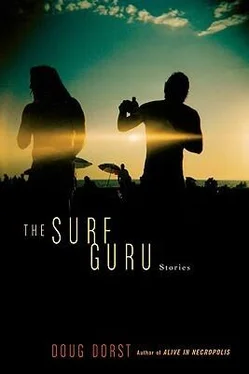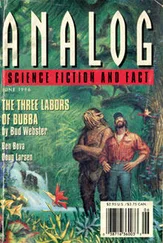She pulled her daughter close, about to whisper, See the bride? Doesn’t she look beautiful? But when she turned to look at April’s full-moon face up close, she stopped herself. She saw patches of hair missing from both of April’s eyebrows. Some of her eyelashes were gone, too; what had once been soft fans now looked like insect wings torn apart by cruel little boys. Pinpoints of blood red dotted the rims of her eyes, which still held a vacant, checked-out look. She instantly regretted bringing April with her. Forcing her to admire Dinaburg’s daughter would be awful, unforgivable. “Let’s go,” she said, leading April away from the door. “Let’s go see the cake.”
“Who were those people?” April asked.
“They’re from New York,” she said.
The kitchen staff said nothing when they walked through the swinging doors. They all recognized her from previous weddings; they’d jumped at the orders she’d barked, kept a safe distance while she’d added the final decorations and circled the cake, searching for imperfections. “Where’s the cake?” Kacy demanded. “I’m a special consultant to Mr. Dinaburg.” One of the dishwashers pointed to the leftmost walk-in and turned back to his work. Kacy pulled the handle and opened the heavy silver door. They went in.
The cake sat tall on a serving cart. Mist swirled in on currents of humid kitchen air. She felt a strange mix of disappointment and glee. The cake was big, garish, loud, a monstrosity. Nine tiers of chocolate excess and opulence and self-indulgence. Strawberries crowded out by outrageous gnarls of gold-leaf spirals and clots of gum-paste tulip blossoms.
The cold snapped April out of her stupor. “OK, so it’s really big,” she said. “Can we go see Dad now?”
“Shush.” Kacy studied the structure and detected a slight tilt in the third tier and a bulge crowning the sixth. April was right — there was no reason to stay. Dinaburg, she decided, was just a little man with too much money and no taste, and Rona Silverman — with her maroon hair and her tiny, tiny flowers and her magic New York water — was nothing special at all. But she had to be sure. She peeked back into the kitchen to see if anyone was watching. She had an easy path to a knife on a cutting board across the room, and calmly and confidently, she walked out to get it, plucking a clean white hand towel from a laundry box on the floor on her way back.
When April saw her approaching with the knife, she crossed her arms over her chest and said, “Don’t. Jesus, Mom, that’s somebody’s cake.”
Kacy laid a hand on April’s folded arms. “Come on,” she said. “It’ll be our secret.” Under the gentle but insistent weight of Kacy’s hand, April’s arms returned to her sides, and as Kacy hunched over the lowest tier of the cake and pierced the dark chocolate surface, she heard her daughter’s breath quicken and thought, She likes this. She’s having fun, too .
She carefully ran the knife through the cake and excised a piece — a thin piece, but thick enough so she’d be able to get all the flavor — and she folded the towel around it loosely. She looked at the wounded cake. Silverman’s assistant, if he was good enough, would be able to cover it up. She silently dared him to try.
“Let’s go,” she said. “Walk like you belong.”
And April did. She walked quickly and confidently toward the service exit. Kacy watched her, struck by her daughter’s poise and confidence. It dawned on her that April might have barricaded her bedroom door that night because she’d had Skillet in there with her. She was thrilled. Not that April was sleeping with him — if that loser got her pregnant, she’d kill him — but that April was capable of connecting with somebody, that Kacy hadn’t ruined her, that April might not blame her for everything that was wrong in her young life.
They emerged from the building in a small parking lot, where a dozen young people in kitchen garb leaned against cars and smoked. They walked right past a tall, well-muscled young man in a chef’s coat with SILVERMAN CATERING stitched over the breast. He was flirting with a waitress, steadying his tall chef’s hat on her blonde head, and he didn’t even glance at them. They jogged around the hotel on a flagstone walkway, running in rhythm with each other, Kacy in her tennis shoes and April in her clompy black boots. As they waited for the valet to appear with the minivan, Kacy unfolded the towel. Daubs of chocolate icing stuck to the terry cloth. She held the cake out to April. An offering.
They ate with their fingers.
“What’s the verdict?” Kacy asked her daughter, her depressed and mangy daughter whom she loved more than anything.
“It’s good,” April said, a chocolate-buttermilk crumb clinging wetly to her upper lip, “but not as good as yours,” and that was all Kacy needed to hear.
La Fiesta de San Humberto el Menor
It will be a hot day, perhaps the hottest in years. It is only nine o’clock, yet sweat soaks my clothes as I sit alone in the shade of my fruit stand. It has not rained in weeks. The air is as still as San Humberto’s bones.
The great saint is buried in a vault beneath our cathedral, along with the remains of the hyenas that he collected on his travels across the water. Each morning since his death three hundred years ago, the church bells have rung at eight o’clock, sounding the beginning of the daily Mass in his honor. The bells woke me today. In my throbbing head it sounded as if they were calling out, No fruit! No fruit! No fruit! — admonishing me for another late night with the bottle, for another wasted morning. Once again I have disappointed my early customers, the people who like to eat fruit on the cathedral steps as they wait for Mass to begin. Now, with everyone filling the pews inside, the town is quiet except for the buzz of fat, dizzy f lies as they circle and dive and swarm.
I pass several minutes admiring a sturdy beetle as it rolls a dung ball many times its size through the dirt. When I look up again, I see someone running toward me from the town square. Though my vision is blurred, I know it is my friend Vargas, the carpenter. Vargas is a fat man. He runs neither often nor well. When he reaches the stand, he leans on it to support himself. He holds his side and doubles over like a man stuck by a knife. I give him the glass of lemonade I have made for myself; he needs it more than I do.
“Manolo,” he says through shallow breaths. “Come to the square. You will not believe what you see.”
“Who will watch the stand?” I ask.
“Your fruit is safe. Everyone is at Mass.”
We walk toward the square, shading our eyes from the sharp morning sun. “What news could be so important that it makes you run?” I ask.
“You would already know if you had not slept so late,” he scolds. Vargas likes to think it is his job to teach me lessons. I have told him he is wasting his time. Lessons are burdens, and I do not need any more of those.
He turns to me. “It was another one of those nights, yes? You drink and you clean the gun?” He says this quietly, with concern.
“I did not touch the gun,” I lie.
The square is at the exact center of the town, where our two alamedas cross; one runs north-south, the other east-west. In the southwest corner of the square is our town wishing well, shaped from rough-cut chunks of limestone. As we pass it, I mouth a prayer of contrition to the saint and drop in a coin, as is my custom. There is no splash, just the flat sound of the coin landing in the muck below.
Vargas leads me through the square to the mayor’s office. A scroll hangs from the door on a braided purple cord. The parchment is thick and smooth, with bright purple and yellow borders, long black leather fringes attached to the corners, and elegant script that glitters as if it has been written in gold. I want to touch it to see what the gold feels like, but Vargas grabs my wrist. “You might smear it,” he says.
Читать дальше












